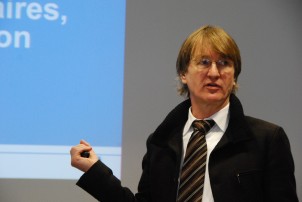Investigating the determinants of food choice, lifestyle and health in European children, adolescents & their parents
I.Family set to reveal key findings of biggest ever study into European children’s diets and lifestyles
Following ten years of research with the largest ever cohort of children across eight countries, the EC-funded I.Family Study will release its key findings and focus on what can be done to tackle problems such as childhood obesity at its final conference next month.
This EC-funded project was designed to investigate food choice, lifestyle and health in European children, adolescents and their parents, and its signature paper – outlining the unique scale of its cohort of children across eight countries – has just been published in the prestigious International Journal of Epidemiology.
It follows the well-known IDEFICS Study, which enrolled 16,000 children across Europe – the largest research study on diet and lifestyle-related diseases in children. The I.Family Study has examined the same children in their ‘tween’ and teenage years, studying their dietary patterns, physical activity, local environments, family relationships, friendship networks and genetic factors.
The I.Family Study Final Conference – to be held at the International Press Centre in Brussels on Thursday February 9th 2017 – will share important findings around children’s and families’ diets, lifestyles and health outcomes, including the major challenge of obesity prevention. Its main focus will be on informing policy and practice at local, national and European levels.
This free, one-day event will be opened by Dr Charmaine Gauci, Superintendent of Public Health at the Ministry for Health in Malta and Coordinator of the Maltese Presidency thematic lead on childhood obesity – one of two key health priorities chosen by the Maltese Presidency of the Council of the EU. Dr Gauci says: “There is sufficient evidence to demonstrate the magnitude of the increasing problem of childhood obesity at the global, European and national level. The negative impacts on health and health outcomes, productivity, quality of life, longevity and significant related social and economic costs are well known.
“Thus, the added knowledge through the findings of the I.Family study is very much welcome and comes at an opportune time given that the Maltese Presidency aims to increase further the momentum in tackling the rise in childhood obesity.
“We aim to adopt a strategic approach so that together we can support each other by way of showcasing good practices and identification of key areas that call for further action.”
Guest speakers will also include Daciana Octavia Sârbu MEP, who is vice-chair of the European Parliament’s Committee on the Environment, Public Health and Food Safety (ENVI), and Artur Furtado, Acting Head of Unit at the Health Determinants & Inequality Unit, DG Sante, European Commission.
For further details about the conference and to see the final draft programme please visit our website at http://www.ifamilystudy.eu/i-family-study-final-conference
ENDS/Contacts and Notes follow
Media contact for I.Family Study – Charlotte Reid +44 (0) 1264 326427/+44 (0) 7921 804641. charlotte@minervacomms.net
Notes for Editors:
- The I.Family Study is an EC funded project under Framework 7 of the KBBE programme running from March 2012 to February 2017. It has 17 partners, working across 11 countries and with cohorts in 8 European countries – Germany, Italy, Sweden, Hungary, Cyprus, Estonia, Spain and Belgium.
- The study has two strategic objectives:
(1) Understand the interplay between barriers against and drivers towards healthy food choice;
(2) Develop and disseminate strategies to induce changes that promote healthy dietary behaviour in European consumers especially adolescents and their parents - The I.Family Study is re-assessing the families first engaged with the Identification and Prevention of Dietary- and Lifestyle-Induced Health Effects in Children and Infants Study (IDEFICS), when children were below 10 years of age, now that they move into adolescence – the ‘tween’ years – identifying those families that have adopted a healthy approach to food and eating habits and those that have not. I. Family is adopting a holistic approach by also investigating the biological, behavioural, social and environmental factors that drive dietary behaviour as children journey towards adulthood.
- There will be an I.Family press conference at the venue just before the start of the I.Family Study Final Conference. Full details of the press conference will follow shortly in a separate notice. Any media wishing to attend the one-day I.Family Study Final Conference should email charlotte@minervacomms.net
5. I.Family study partners
| Participant organisation | Lead investigator(s) | Key responsibilities |
| University of Bremen, Germany | Wolfgang Ahrens | Project coordinator |
| Leibniz Institute for Prevention Research and Epidemiology – BIPS, Germany | Iris Pigeot | German cohort, statistics |
| Institute of Food Sciences, National Research Council, Italy | Alfonso Siani | Italian cohort, nutritional epidemiology |
| Copenhagen Business School, Denmark | Lucia Reisch, Wencke Gwozdz |
Consumer behaviour & environmental influences |
| University of Lancaster, United Kingdom | Garrath Williams | Ethics, policy, and stakeholder engagement |
| Sahlgrenska Academy at the University of Gothenburg, Sweden | Staffan Mårild, Lauren Lissner |
Swedish cohort, family analysis |
| University of Helsinki, Finland | Jaakko Kaprio | Familial aggregation & genetic modelling |
| University of the Baleares Islands, Spain | Andreu Palou, Catalina Picó |
Genomic analysis |
| University of Pécs, Hungary | Dénes Molnár | Hungarian cohort |
| Rudolf Magnus Institute of Neuroscience, The Netherlands | Roger Adan | Neuroimaging & neuropsychology |
| Research and Education Institute of Child Health, Cyprus | Michael Tornaritis | Cypriot cohort |
| National Institute for Health Development, Estonia | Toomas Veidebaum | Estonian cohort |
| Fondazione IRCCS Istituto Nazionale Tumori, Italy | Vittorio Krogh | Dietary assessment methods |
| University of Bristol, United Kingdom | Angie Page, Ashley Cooper |
Physical activity monitoring |
| Minerva PRC Ltd, United Kingdom | Rhonda Smith Charlotte Reid |
Dissemination and communication |
| University of Zaragoza, Spain | Luis Moreno | Spanish cohort |
| Ghent University, Belgium | Stefaan De Henauw | Belgian cohort |
Notes/End
I.Family is EC funded Project No. 266044 building on the IDEFICS study







